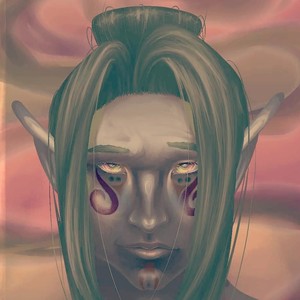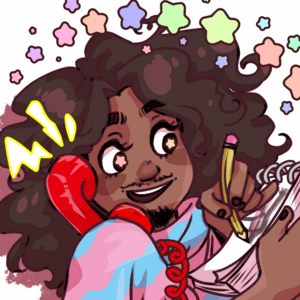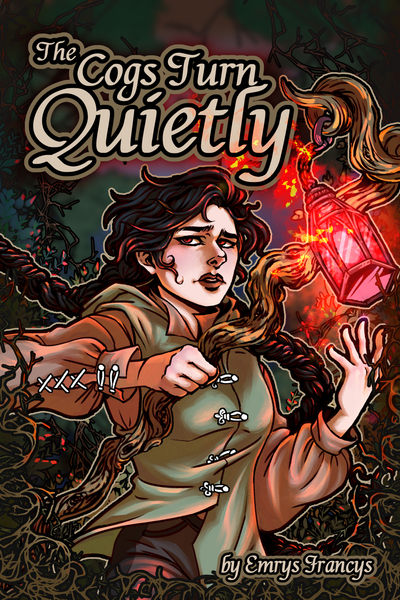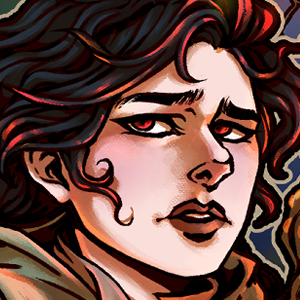Bhaltair had always been a little bit different from other Laringdenese. While the majority of them had found comfort and a sense of belonging in the forest, Bhaltair had thought there was something wrong with themself for always wondering what was outside and beyond it.
Once they were old enough, they set out for other places and other peoples, hoping to learn from them and maybe even find somewhere people were more like-minded. The closest they came was a travelling town called R’Hukvotth, named for its founder and mayor, of sorts and of the same name. Unfortunately, it didn’t take long for Bhaltair to realise that, although the place was amazing and the people made sense in a way that other people hadn’t before, R’Hukvotth (the place) didn’t have any of the feeling of home that Laringden did. Not for them, anyway.
They returned to Laringden the following spring, with new tales to tell and new songs to sing. Counter to the many anxieties they had experienced on the way back, they had been welcomed with open arms by the people they called home. Even the trees accommodated for them with a new treehouse and, for some time, they lived in Laringden content that they now knew what lay beyond the trees, and it wasn’t home.
Unfortunately, Bhaltair’s wanderlust struck again the following year. They tried to ignore it for a spell, but that only fed their curiosity. In the end, they had come to the conclusion that yes, Laringden was home, but it was only a part of their home. The rest of it was out there, with different people, in different places, experiencing different things like learning new instruments and inevitably learning about sithseiðr. Laringden was where their body rested, but throughout the continent of Kasata and beyond was where their heart and mind thrived.
For Ruskin, on the other hand, his little village was everything to him. Throughout his childhood, he had never considered leaving. Though he too had never felt the comfort of close interpersonal relationships with his hometown’s inhabitants, his privileged position as the preacher’s son meant that he was still highly regarded, even if people often didn’t know what to make of him and frequently took a second opinion on the advice and medicines he prescribed. In addition, the respected position both of his parents held meant that he was always provided for. He’d never wanted for anything in his life.
His passion for studying and practising apothecary, however, drove him away from his beloved hometown and towards bigger Kasatan cities like Arkwright and even to the island of Janeve, at the far side of the distant continent of Eustagar. It had all been very illuminating and, at times, quite shocking to see how people lived in these places, and he had learnt so much from their apothecaries, healers, surgeons, and teachers, but he could never stay away from home for long, and always returned as soon as he had a new project to work on in the sheds.
He too had met R’Hukvotth (the person); apparently all those who travelled around Kasata were likely to meet him at some point. For Ruskin, it had been on the outskirts of Arkwright. While Bhaltair had been impressed by just how large the man was, Ruskin remembered only the warmth of his smile.
Upon returning home, he may not have been given the warm town-wide welcome that Bhaltair had, but Ruskin’s parents and grandparents made a considerable fuss each and every time, putting on a large spread of food and demanding that he tell them everything that he’d learnt. Of course, Ruskin obliged until they told him to stop.
Taru listened to the two talk about their lives and the things they had done and seen with no small amount of envy. It wasn’t just how much and far they’d travelled, or even what they’d learnt: it was the connections they made and, more than anything, the ones they returned to. She wondered if Enna would welcome her so happily when she returned. She did worry that the orphanage might have, as they often did when someone went missing, written her up as illegally advanced, meaning that they assumed she had taken on a new identity and married up. She had a sneaking suspicion this had happened only once, but the custodians now used that excuse for every missing person’s case to avoid the scrutiny of the Namekeepers. Sadly, she knew for a fact that more than one missing person had been a self-exit of a different nature.
When she thought of home, all she could think of was her job, the orphanage, and Enna. She didn’t have any friends. She didn’t have the time. For the same reason, she didn’t have any hobbies. The only days she got off work were the same as everyone else got for festivals. Because of that, her time off was taken up with social events whether at the orphanage, with Enna, or at the proper venue.
So she didn’t say anything when Ruskin and Bhaltair left space for her to speak. Instead, she pretended not to understand it was her turn until one or other of them asked her for input, when she’d shrug and say her life wasn’t very interesting at all. Because… well… it wasn’t, was it? After a while, though the pair still included her in the conversation, they stopped asking for her thoughts.
-~*~-
The conversation shrank down to sharp warnings and nervous queries when the forest’s darkness reached such a depth that it would’ve made even the flattest, clearest path dangerous to follow. The problem was, their path wasn’t flat or clear. Just when they’d overcome a particularly steep climb there came a narrow path with a sheer drop of unknown depth to one side. Once they were past that, a tangle of weeds and reedy trees that hadn’t seemed to be there before would force them into a bog or down a muddy slope.
It might’ve been okay for someone with the sharp senses of Bhaltair, or the keen sense of direction that Ruskin had, but for a city-girl like Taru with her damaged ankle, even when it was good it was slow going. She felt more of a burden with every step, even though each step now carried her full weight. It was as she was smothering another wince from keeping pace with the others that Bhaltair broke the silence.
“So,” they began, slowing the pace a few steps ahead. “I think it might be time to accept the truth,” they said quietly, and Taru froze.
“Truth?” she said, voice strained.
“Aye, the truth. Don’t pretend you don’t know it,” Bhaltair insisted.
Taru swallowed. Her ankle had been getting better, and she was picking up the pace. She’d hardly thought she was slowing them down any more.
“We’re lost,” Ruskin muttered, glancing sharply into the trees as if he had heard something.
“Aye, that’s it,” Bhaltair said.
Taru couldn’t stop the breath of relief that left her. Her relief was short-lived, however, as Bhaltair continued,
“I can’t hear the river any more. Honestly, it’s like this darkness is eating up sound.” As they spoke, they rubbed at the side of their neck and then behind a twitching ear.
Taru couldn’t see so well in the shadows, but she could’ve sworn the sprawling lines of their injury had spread and that they were darker.
Meanwhile, Ruskin stepped past Bhaltair to take the lead at the front. “Well the surest way not to get where we want to go is to stand still.”
“What rot,” laughed Bhaltair. “The surest way to ensure we end up even more lost is to wander around aimlessly in the dark.”
“Well, what do you suggest? We can’t just stand here.”
“There’s a thousand directions we could go that’ll get us further away and only one that’ll take us where we want.”
Taru held up a hand, ready to try and bring peace between the two of them, but something pale and tall and human-shaped caught her attention in the trees. “Do you see that?” she asked, shifting around in her shirt to try and ease the growing irritation between her shoulder blades.
“You’re not answering my question,” Ruskin pressed Bhaltair as if Taru had said nothing.
“Maybe a quick song of direction wouldn’t hurt,” Bhaltair suggested as, Ruskin scoffing in disbelief, the two of them began to move away from Taru.
“Oh is that right? I can’t call on the weave to help heal Taru’s ankle—which, by the way, would probably have gotten us where we need to go by now—but you can sing a pretty little ditty whenever your ears fail you.”
“Better that than wandering about without a damn clue!”
“Isn’t that right, little skvader?” said a voice deep inside her mind as the pale shape between the trees drifted closer. “Wouldn’t it be better to know where you’re going?” The figure was at the closest tree, arm’s length away. With a jolt, Taru regained control of herself and bolted after her companions, the memory of the pain in her ankle now completely forgotten. And what had it been, a day? Less? More?
She didn’t know anymore, not in this place. Someone could tell her it had been a week and she would believe it.
When she rejoined Ruskin and Bhaltair, they were deep in a tense silence. She daren’t break it, especially not to tell them what she’d seen. They wouldn’t believe her. They wouldn’t believe her because she didn’t believe her. They’d see her as even more of a liability, losing her mental as well as her physical stability. And she probably couldn’t tell them that, either: that she felt as if her ankle had already healed. It worried her that she felt that way. It couldn’t possibly have healed that quickly. It was one thing healing quicker than expected when she was 15 and in a comfortable environment with lots of care and attention, but out here in this forsaken place with two irritable companions, not a single potion, and no comfort, there was no way she was really healed. It had to be another trick of the forest, making her feel as if there was no injury so she would damage it further. She had to continue as if there was. Pain was, after all, the body’s way of saying there was something wrong. If something was stopping that message from getting through, then she had to ignore pain’s absence and pretend it was still there.
She began lifting her foot again, leaning a little heavier on the walking-stick and ensuring she wasn’t putting pressure on the area. One of the benefits of walking this way was that it took so much concentration, she could almost forget about the now permanent tingle across the backs of her shoulders.
With every difficult step, she ignored the pale figure in the corner of her eye. With every laboured breath, she pretended she couldn’t hear the only Shudean who had ever shown her real kindness berating her for her poor decisions; mocking her for ever wanting to leave the city.
“Look at you,” he said. “Got everythin’ you wanted, din’t you? And now what? Don’t know what to do with it, do you? Don’t want it anymore, now, do you? Now, you just want to go home.” He scoffed. “Pathetic.”












Comments (1)
See all